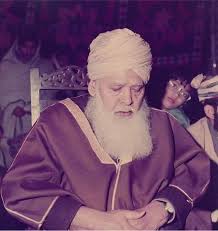This article needs additional citations for verification. (March 2022) |
Ahmad Saeed Kazmi | |
|---|---|
 | |
| Title |
|
| Personal | |
| Born | 13 March 1913 Amroha, India |
| Died | 4 June 1986 |
| Resting place | Multan |
| Religion | Islam |
| Nationality | Pakistani |
| Children | Hamid Saeed Kazmi |
| Region | South Asia |
| Denomination | Sunni |
| Jurisprudence | Hanafi |
| Creed | Maturidi |
| Movement | Pakistan Movement |
| Alma mater | Madrasa Mohammadiya, Amroha |
| Tariqa | Qadri |
| Known for | Contribution to Pakistan Movement, Urdu translation and Tafseer of Quran, Dars-e-Hadith |
Syed Ahmad Saeed Kazmi (13 March 1913 – 4 June 1986, Urdu: سید احمد سعید کاظمی) was a Pakistani Islamic scholar and Sufi who belonged to the Barelvi movement of Sunni Islam.[1] He migrated to Multan in 1935 from Amroha.[2][3] He is known for his contribution to the Pakistan Movement, Urdu translation and Tafseer of Quran, and Dars-e-Hadith.[4] His tomb sits next to Multan's 18th century Shahi Eid Gah Mosque.[5][6]
Early life and education
Ahmed Saeed Kazmi was born to Syed Muhammad Mukhtaar Ahmad Shah Kazmi in Amroha, Uttar Pradesh. he got his basic education from his mother. Later on his uncle gave him Sanad-e-Hadith and spiritual education which polished his Allah gifted qualities.[7]
See also
References
- ^ "All writings of Syed Ahmad Saeed Kazmi". Rekhta. Archived from the original on 30 August 2023. Retrieved 30 August 2023.
- ^ The Journal of Political Science. Department of Political Science, Government College. 1995. p. 126. Archived from the original on 5 October 2023. Retrieved 18 March 2023.
- ^ Qadri, Muhammad Tahir ul- (1987). Islamic concept of Law. Minhaj-ul-Quran Publications. ISBN 978-969-32-0525-1. Archived from the original on 20 November 2023. Retrieved 29 October 2023.
- ^ Julius, Qaiser (30 September 2017). Ahmadi and Christian Socio-Political Responses to Pakistan's Blasphemy Laws: A Comparison, Contrast and Critique with Special Reference to the Christian Church in Pakistan. Langham Publishing. ISBN 978-1-78368-329-1. Archived from the original on 20 November 2023. Retrieved 29 October 2023.
- ^ "Ghazali e Zaman Syed Ahmad Saeed Kazmi رحمتہ اللہ علیہ". Aal-e-Qutub Aal-e-Syed Abdullah Shah Ghazi. 31 May 2019. Archived from the original on 30 August 2023. Retrieved 30 August 2023.
- ^ T̤āhirulqādrī, Muḥammad (2005). Islam and Christianity. Minhaj-ul-Quran Publications. ISBN 978-969-32-0529-9. Archived from the original on 20 November 2023. Retrieved 29 October 2023.
- ^ The Ghadir Declaration (Spiritual sovereighty of caliphate Ali RA). Minhaj-ul-Quran Publications. ISBN 978-969-32-0513-8. Archived from the original on 20 November 2023. Retrieved 29 October 2023.
External links
 Media related to Ahmad Saeed Kazmi at Wikimedia Commons
Media related to Ahmad Saeed Kazmi at Wikimedia Commons- Audio Files
- Books by Kazmi at Kazmis.com
- 1913 births
- 1986 deaths
- 20th-century Muslim scholars of Islam
- Pakistani Sufis
- People from Amroha district
- Pakistani Sunni Muslims
- Muhajir people
- People from Multan
- Jamiat Ulema-e-Pakistan politicians
- Punjabi Sufis
- Translators of the Quran into Urdu
- Barelvis
- Pakistani people of Arab descent
- 20th-century translators









